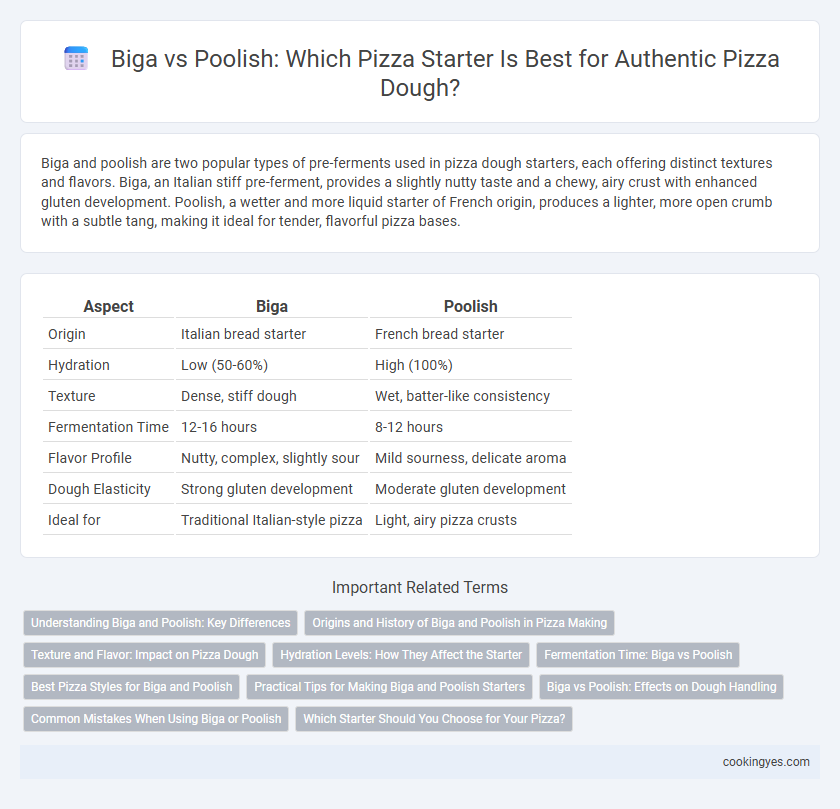Biga and poolish are two popular types of pre-ferments used in pizza dough starters, each offering distinct textures and flavors. Biga, an Italian stiff pre-ferment, provides a slightly nutty taste and a chewy, airy crust with enhanced gluten development. Poolish, a wetter and more liquid starter of French origin, produces a lighter, more open crumb with a subtle tang, making it ideal for tender, flavorful pizza bases.
Table of Comparison
| Aspect | Biga | Poolish |
|---|---|---|
| Origin | Italian bread starter | French bread starter |
| Hydration | Low (50-60%) | High (100%) |
| Texture | Dense, stiff dough | Wet, batter-like consistency |
| Fermentation Time | 12-16 hours | 8-12 hours |
| Flavor Profile | Nutty, complex, slightly sour | Mild sourness, delicate aroma |
| Dough Elasticity | Strong gluten development | Moderate gluten development |
| Ideal for | Traditional Italian-style pizza | Light, airy pizza crusts |
Understanding Biga and Poolish: Key Differences
Biga and Poolish are both traditional pizza starters that enhance dough flavor and texture through fermentation, but they differ in hydration and consistency. Biga is a stiff starter with low hydration, typically around 50-60%, leading to a more structured crumb and slight tang, while Poolish is a wetter, sponge-like starter with equal parts flour and water (100% hydration), producing a lighter, airier crust. These differences influence fermentation time and dough elasticity, with Biga requiring longer fermentation and Poolish promoting faster yeast activity and a more open crumb structure.
Origins and History of Biga and Poolish in Pizza Making
Biga and Poolish are traditional Italian and French preferments respectively, each playing a crucial role in the art of pizza dough preparation. Biga, originating from Italy, has been used in Italian baking for centuries to enhance flavor and texture by extending fermentation time. Poolish, with roots in French baking history, gained popularity for its high hydration and ability to produce a light, airy crumb, influencing various styles of artisan pizza dough worldwide.
Texture and Flavor: Impact on Pizza Dough
Biga contributes a denser, chewier texture and a mild, nutty flavor to pizza dough due to its longer fermentation and lower hydration. Poolish, with higher hydration, produces a lighter, airier crumb and a more pronounced tangy flavor from increased yeast activity. Choosing between biga and poolish affects crust crispness, dough extensibility, and the overall complexity of the pizza's taste profile.
Hydration Levels: How They Affect the Starter
Biga and poolish differ significantly in hydration levels, which directly impact the fermentation and texture of pizza dough. Biga typically has a lower hydration of around 50-60%, creating a stiffer starter that results in a denser crumb and enhanced flavor complexity. Poolish, with hydration close to 100%, produces a wetter, more extensible dough, leading to a lighter, airier crust with more open crumb structure.
Fermentation Time: Biga vs Poolish
Biga fermentation time typically ranges from 12 to 16 hours at room temperature, creating a firm, dense starter with a slower, more complex flavor development ideal for Neapolitan-style pizza dough. Poolish requires a shorter fermentation period, usually between 8 to 12 hours, producing a wetter, more liquid starter that enhances dough extensibility and promotes a lighter crumb structure. Adjusting fermentation time for either starter impacts the dough's taste, texture, and rise, making time management essential for optimal pizza crust quality.
Best Pizza Styles for Biga and Poolish
Biga is ideal for Neapolitan and Roman-style pizzas, offering a dough with a firm texture and enhanced flavor due to its long fermentation. Poolish, with its wetter consistency, suits New York-style and focaccia pizzas by creating a lighter, airier crumb and a slightly tangy taste. Both starters improve dough extensibility and flavor complexity but cater to different pizza styles based on hydration and fermentation characteristics.
Practical Tips for Making Biga and Poolish Starters
For making Biga starters, use a low hydration level around 50-60% with strong bread flour to develop a dense, firm dough that ferments slowly, enhancing flavor and structure. Poolish requires equal parts water and flour (100% hydration) for a batter-like consistency, promoting rapid fermentation and a lighter crumb in the pizza crust. Maintain room temperature for Poolish fermentation (about 70degF) for 12-16 hours, while Biga benefits from a cooler, longer fermentation of 16-24 hours to maximize gluten development and acidity.
Biga vs Poolish: Effects on Dough Handling
Biga, a stiff Italian pre-ferment, offers a denser dough texture that improves gluten development and results in a chewier crust, enhancing dough elasticity for easier handling. Poolish, a wetter French starter, produces a more extensible dough that extends fermentation time, leading to softer, airier pizza crusts with increased hydration management. Choosing between Biga and Poolish impacts dough workability and final pizza texture, with Biga favoring structure and Poolish promoting tenderness.
Common Mistakes When Using Biga or Poolish
Common mistakes when using biga or poolish as pizza starters include over-fermentation, which can lead to an overly sour taste and weak gluten structure, compromising the dough's elasticity and oven spring. Another frequent error is incorrect hydration levels; biga typically has lower hydration (around 50-60%) whereas poolish uses equal parts water and flour (100% hydration), affecting dough consistency and texture. Finally, neglecting temperature control during fermentation can result in uneven yeast activity, causing inconsistent dough rise and flavor development.
Which Starter Should You Choose for Your Pizza?
Biga offers a drier, denser texture and a subtle tang that enhances the crust's complexity, making it ideal for traditional Italian-style pizza with a chewy bite. Poolish, with its higher hydration and wetter consistency, produces a lighter, airier dough with a more pronounced fermentation flavor, perfect for a soft, open crumb. Choose Biga for a robust, crispy crust and Poolish for a tender, flavorful base.
Biga vs Poolish for pizza starter Infographic

 cookingyes.com
cookingyes.com